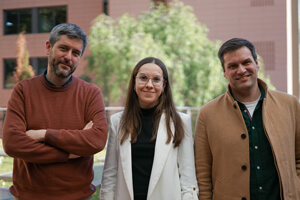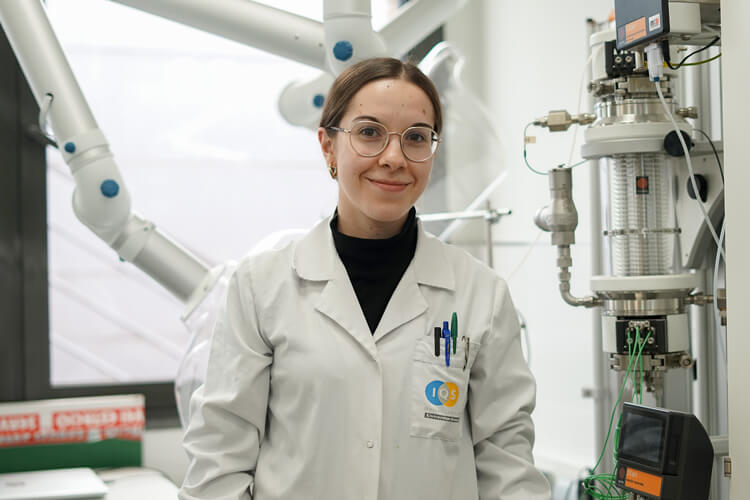New proposals with continuous flow chemistry
In 2022, two members of the IQS community earned the competitive University Professor Training Grants (FPU Grants), awarded by the Ministry of Universities within the framework of the State Plan for Scientific and Technical Research and Innovation (PEICTI) 2021-2023.
Maite Molins Colomer, a PhD student in the Department of Chemical Engineering and Materials Science within the IQS School of Engineering, earned one of the thirteen FPU Grants awarded in the field of Chemical Technology in the last call for proposals. Maite’s project addresses “Continuous flow reactions using autocatalytic copper reactors aimed at obtaining active pharmaceutical ingredients (APIs),” and is being jointly supervised by Dr Javier Fernández and Dr Xavier Berzosa.
The project is aimed at making a contribution to pharmaceutical chemistry with sustainable aspects. Her research is opening up an interesting line of collaboration between two research groups at IQS: the Environmental Process Engineering and Simulation Group (GESPA), of which Dr Javier Fernández is a member, and the Chemical Reactions for Innovative Solutions Group (CRISOL), of which Dr Xavier Berzosa is a member. The link in this collaboration is doctoral student Maite Molins, who studied the Undergraduate Programme in Chemical Engineering and the Master’s Degree in Industrial Engineering at IQS.
Maite, what does earning this FPU Grant mean to you?
It’s incredibly rewarding! I earned one of the 13 chemical technology grants in the last call for proposals. A total of 885 grants were awarded, and the field of chemical technology had the highest cut-off grade. It was a tough grant to get!
I’m really pleased. It’s a prestigious four-year grant for dedicating myself exclusively to the doctorate. Moreover, it’s also for university professor training, and I can’t rule out working as a professor in the future.
What is the objective of your thesis?
The project involves a collaboration between the GESPA group and the CRISOL group. On the one hand, we are producing products for the pharmaceutical industry using continuous reactors, one of the pillars of Green Chemistry. This is the Dr Xavier Berzosa’s area of expertise, and he contributes a comprehensive vision of organic chemistry and what happens in the reactions. On the other hand, we want to add aspects related to process engineering and optimization, reactor engineering, and the integration of sustainable processes, which are Dr Javier Fernández’s areas of expertise.

As another point of sustainability in addition to producing these products for the pharmaceutical industry, one of the most interesting aspects of the project is the use of autocatalytic copper reactors, a catalyst that is more available, abundant, and economical than noble metals (such as palladium). We’ll begin by demonstrating the feasibility of this autocatalysis with simple reactions that can be used in API synthesis pathways in order to evaluate their subsequent scaling.
How do these types of autocatalytic reactors work?
It involves tubular reactors made of copper in which this metal is detached from the walls when the flow circulates, acting as a catalyst for the reaction that takes place inside. In this way, the reactor does both functions: it is part of the process equipment and the catalyst at the same time. It comes apart in the long run, but very slowly. In fact, one of the points to study is the number of reaction cycles that this type of equipment can support.
In the end, it’s an economical solution because these copper reactors have a low cost, high availability, and provide an active catalyst to the reaction medium.
To close, why did you switch from Tissue Engineering to Process Engineering?
The truth is that I really enjoyed Tissue Engineering during the eight years I worked with Dr Jordi Martorell and the GEVAB group. I learned a great deal related to Biotechnology and Health Sciences. But I didn’t see myself pursuing that discipline professionally. And when offered the proposal by Dr Fernández and Dr Berzosa to do a doctorate between Chemical Engineering and Pharmaceutical Chemistry, I ended up choosing to do it as it really excited me. So here I am!
A highly sustainable engineering project
Flow Chemistry, or continuous flow chemistry, is one of the pillars of sustainable chemistry, a need the chemical sector faces in terms of the European Union’s Green Deal 2050 objective and which is very relevant at present.
In line with IQS’s strong commitment to Flow Chemistry, especially in the field of Fine Pharmaceutical Chemistry, this collaborative project between the GESPA and CRISOL groups provides the opportunity to take our work far beyond the study of reactions themselves and incorporate aspects of both industrial and chemical engineering, especially in process control elements.
In the words of Dr Javier Fernández, “Maite’s FPU grant gives us a great opportunity to continue working with catalysis and continuous processes, an area in which I had already worked during my postdoctoral studies at The University of Warwick and which I wanted to bring here to IQS. Maite is a highly talented individual who can really advance this research. With all this in mind, we have started a new line of research, which will open many doors for both research groups.”
In the words of Dr Xavier Berzosa, “this project will greatly expand the capabilities we already have in the field of Flow Chemistry within our group. With the addition of Maite and Javier, we now have the opportunity to develop and implement more efficient processes in the field of Fine Chemistry. With her thesis, we also have further options to include more research papers that explore the limits of this project.”
This predoctoral contract has obtained funding from the Ministry of Universities for University Professor Training.



